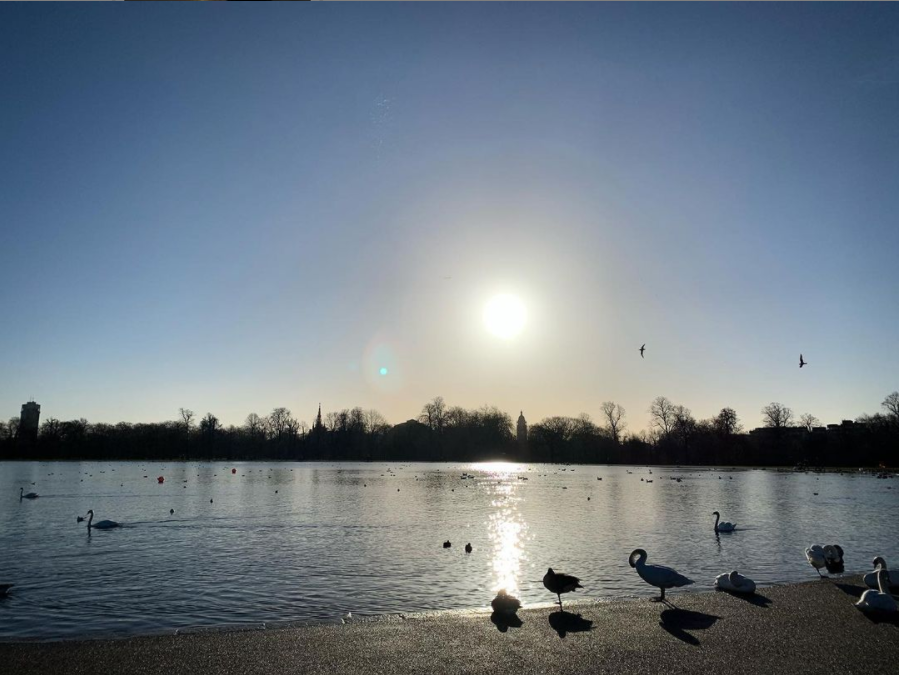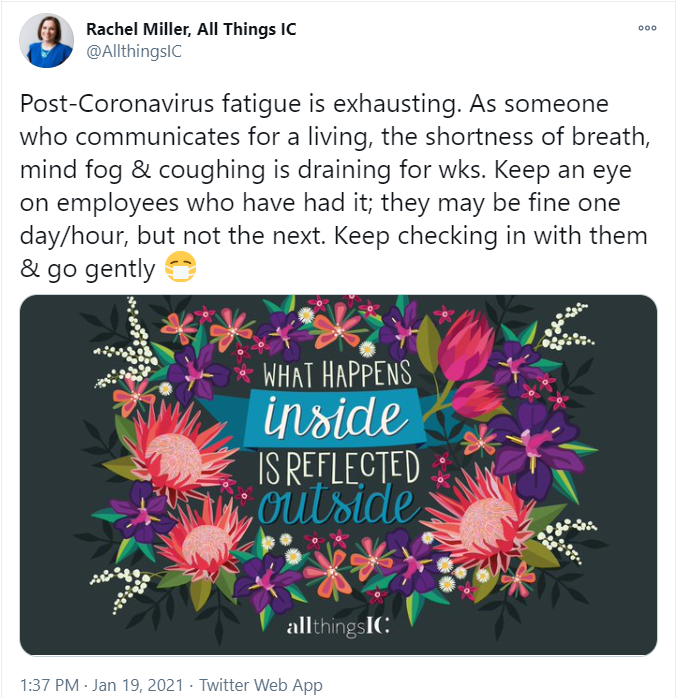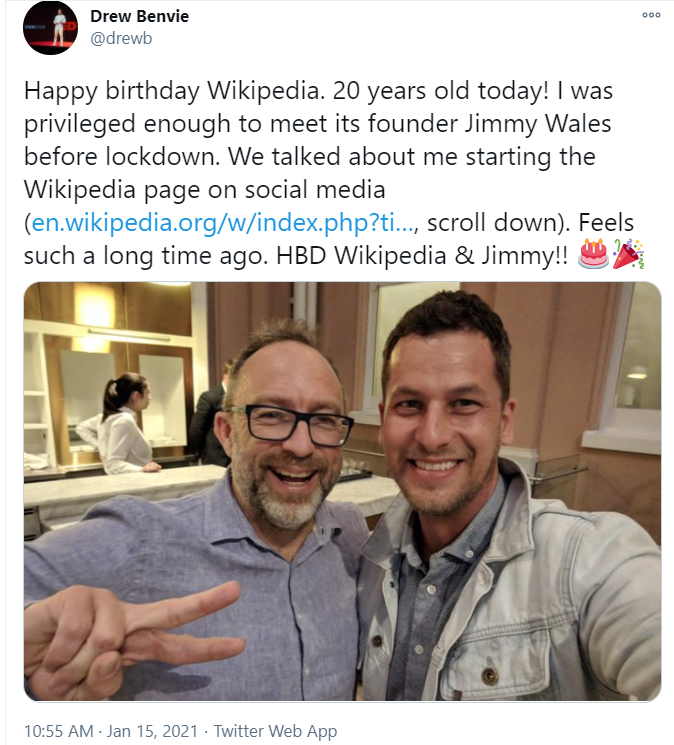This week in PR (22 January)

About the author
Richard Bailey Hon FCIPR is editor of PR Academy's PR Place Insights. He teaches and assesses undergraduate, postgraduate and professional students.

News in brief
I wonder if history will show it was mainly the impact of coronavirus that got rid of Trump?
It linked his idiocy and incompetence to real people dying.
America didn't go into the election in an economic boom.
His evilness only became a real issue in America after he'd lost.
— Tony Langham (@TonyLangham) January 21, 2021
- In its response to the Government’s review of the 2014 Lobbying Act, the PRCA has called for major changes.
- Michael Bland, crisis communication author and trainer, has died aged 76. See below for an obituary written by his son Ben.
Covid-19 and comms
- Emma Morris: Seven social media tips for lockdown (20 January)
‘One great thing that has come out of this pandemic is the desire for people to support local businesses. And local businesses should do the same by supporting each other.’ - Stephen Waddington: Book review: Post Corona by Scott Galloway (19 January)
‘Galloway’s view is that the pandemic’s enduring impact will be an acceleration for technology, and no area of the economy will be left unchanged. The book and the case studies are all US centric but you don’t have to work hard to apply Galloway’s work to other markets.’# - Ross Wigham: Postcard on covid comms vol4 (16 January)
‘NHS comms has been in full swing again this week and it was great to see the North East leading the pack in terms of numbers.’
Ethics, purpose and professionalism
- Kerry Sheehan: Building on the lessons of 2020 for 2021’s opportunities in PR and communications (18 January)
‘A focus area must be to listen, analyse, plan, act – shifting to being anticipatory. Business models will continue to adapt and innovate; this is the new normal.’ - Laura Sutherland: Laura speaks to Simon Francis about social impact and collaboration [podcast] (19 January)
‘First do no harm. Nothing you do as a communicator should cause harm: this is something our industry struggles with. Social impact is not the preserve solely of charities and social enterprises.’
- Maja Pawinska Sims with Kirsty Leighton and Fiona Gildea: Milk & Honey on building a sustainable agency [podcast] (19 January)
‘Everybody is talking about ESG: it seems to be the buzz word – along with purpose – on everyone’s lips. I don’t actually think any of us have all of the answers here – big agencies or management consultancies. We need to collaborate and bring outside experts into the mix.’
Corporate and financial
- Bob Huxford: The Law of Small Edges and the Need for Financial Education (20 January)
‘Even fund managers don’t have time to examine in minute detail all the companies they invest in, which is a key reason for the existence of the equity analyst role.’ - Alex Malouf: The Politics of Business – Edelman’s Latest Barometer Summary (15 January)
‘Businesses are trusted more than any other group (that includes NGOs, governments and media). Businesses are also seen as the only segment that is both ethical and competent.’
Consulting, teams and careers
- Ben Bland: Michael Bland Obituary (21 January)
‘In his late fifties, around twenty years before his death, Bland was diagnosed with Parkinson’s disease. Despite the gradual degenerative effects of the disease, he remained physically fit until the last few years, and was able to maintain his independence until the end.’ - Alison Gallagher-Hughes: Top tips for effective pet PR (20 January)
‘25% of the nation’s households now own a dog and 17%, a cat, equating to 9 million dogs and 7.5 million cats in the UK.’ - Stella Bayles with Brendon Craigie: PR without borders (and offices!) [podcast] (18 January)
‘I’ve spent roughly 20 years working in communications and I’ve felt communications consultants in agencies tended to work in siloed teams. Global businesses need a different communication service.’
Wellbeing, gender and diversity
https://twitter.com/J0gunleye/status/1351937669727711234
- Danny Rogers: Blue Monday 2021: More than ever, we need help beating the blues – and marketers are showing us how (18 January)
‘One can’t help thinking that if more bosses don’t provide empathy and flexibility to their teams the business world will be sitting on a mental health time bomb.’
Public and third sectors
Very pleased to welcome @davidhold to @UKgovcomms as he begins an interim role as Director of Comms @mhclg while a successor to Priya Brahmbhatt Patel is recruited, as Priya moves to @ofgem We both support movement between tiers of govt and grateful to @LGAcomms for his services!
— Alex Stuart Aiken (@AlexanderAiken) January 15, 2021
- Dan Slee: SURVEY: As the pandemic drags on public sector comms mental health is suffering (21 January)
‘Almost seven in ten of government, fire, police, NHS and local government communicators say their mental health is worse now than before the pandemic struck.’
- Shaun Gibbons: How and why the ‘Don’t be a Dick’ public health campaign was created (17 January)
‘Cutting through the social media noise and the ‘vanilla’ messaging (a colleague’s phrase, not mine) was Dick’s primary objective. And with nearly half a million views in the first few days of the campaign, this spiky little individual did just that.’
- Hel Reynolds: Powerful real-life storytelling on Facebook is content of the week (15 January)
‘It is not easy to find a good story, get permission to share it with great picture to illustrate. This was SO worth the effort from the council comms team.’
Politics, public affairs and public sphere
- Gareth Jones: Sunak’s fiscal dilemma (21 January)
‘As we head towards 3rd March, the Treasury and Number 10 will be facing a series of very tough decisions about public spending.’ - Simon Gentry: Vaccines, ideology and Britain on the world stage (19 January)
‘Fear of the media and the need to satisfy the insatiable is a feature of Boris Johnson’s government and not one that endears him to his backbenchers or critics.’ - Dafydd Rees: The Power of Persistence and Persuasion (19 January)
‘A highly organised and well-funded defence of Slavery was mounted in Government and by powerful business interests heavily invested in the sugar trade in the West Indies. The Establishment utilised every spurious economic, moral and indeed religious argument to justify the continuation of Slavery.’
Campaigns and creativity
- Sarah Evans: Helping audiences overcome the Ostrich Effect (21 January)
‘The Ostrich Effect is a phenomenon when people actively avoid information they consider negative or unpleasant. It’s a conflict between our rational mind and the pain we anticipate with our emotional mind.’ - Andy Green: The true story behind ‘Blue Monday’ (18 January)
‘The story behind ‘Blue Monday’ provides an exemplary example of what I call ‘creative recycling and upcycling’ – how you can use an existing idea to address a challenge.’
Brands, storytelling, and influence
- Orlagh Shanks: What’s The Deal With Influencer Creator Houses? (20 January)
‘One of the most famous TikTok creator houses, Hype House sits in Los Angeles and is home to 19 TikTok stars. TikTok stars like 15-year-old Charli D’Amelio (who recently had a Dunkin Donuts drink named after her and has 106.2 million followers on the app) drop in on the mansion to get their creative juices flowing.’
- Jen Derrick: National Thesaurus Day – Editing content tips to make you a better writer (18 January)
‘It can be difficult to explain intangible features – especially when describing a technical product or service. For example, the words ‘quality’ and ‘powerful’ are hard to visualise. Metaphors allow you to convey an intangible thing by describing it as a tangible thing.’
- Scott Guthrie: Love Island, test & trace and that £63,000 (18 January)
‘We now know the UK government spent £63,000 paying Love Island stars for their part in promoting the Test and Trace app. Was it money well spent?’
Internal communication

- Nicholas Wardle: Is it now Internal Communication or Internal Collaboration? (20 January)
‘In the last decade or so, we have gone from internal journalism, to content curation, to now content enablers. So, what’s next?’
Technology, media and digital

- Adam Tuckwell and Jon Wilcox: The PR Hub podcast on… podcasting (21 January)
‘Podcasting is radio on demand, it’s incredibly accessible for audiences and it’s equally accessible and cheap to produce. That’s why it seems like everyone has a pod these days!’ - Matt Silver: What’s up with Whatsapp: the messaging app meltdown (18 January)
‘How did one of the most successful messaging companies get something that was relatively simple to communicate so wrong, and what will happen now?’ - Katy Howell: Serious Social – From first date to wedded bliss [podcast]
‘Why do relationships matter on social media? Basically, there’s an overwhelming competition for attention.’
- Robert Minton-Taylor: A Simple Act of Kindness – had me in tears. (16 January)
‘As I was recovering from a stroke after discharge from Airedale General Hospital in West Yorkshire, UK I received a handwritten letter in the post from a national newspaper journalist I had never met or spoken to.’
Probably going to write a blog on the whole ‘PR bashing’ debacle so if anyone has any views or experiences (love an anecdote) that they’d like to share please let me know below
— Jessica (@jessicapardoePR) January 18, 2021
#prstudent #bestPRblogs
https://twitter.com/carolineshawPR/status/1351897020978626560
- Megan Laura Harris (Liverpool John Moores): Influencers and COVID-19 – is it ethical to promote Track and Trace and then go on a work holiday? (21 January)
‘I don’t think it is right that these ‘influencers’ who use their platforms to promote the NHS system to escape to another country for a so called ‘work holiday’. It would be bad enough if they weren’t posting about it but they are. Do these influencers have no shame, no ethics?’ - Kayleigh Tinney (Ulster): The Power of a Morning Routine (21 January)
‘I always start my morning by journaling as it gives me the opportunity to be at one with my thoughts. There is something very powerful about waking up and writing down a few things that you are grateful for in your life.’
- Lindelani Moyo (Birmingham City): University experience of a PR student (21 January)
‘The COVID-19 pandemic has obviously changed the social experience within the university. Although we can’t socialise physically we are encouraged to connect via Microsoft teams and the university has hosted a lot of virtual social activities so students can socialise with one another.’ - Cliodhna Donnelly (Ulster): 2020 – A Year for PR to Shine. Here’s my favourites (21 January)
‘In many ways, I feel privileged to have been exposed to such innovation, creativity and resilience this year, at a time in my life where I will soon be a young professional challenged to think of new ideas and ways of working.’
- Eloise Newman (Solent): In What Ways Can Social Media And Virtual Communication Be Used To Create Positive Change? (21 January)
‘Today’s blog explores one of the many ways that social media can be used positively, to join people together in times where we are separated.’
- Aveem Moore (Ulster): COVID-19 UK: How social media has affected communication during a pandemic. (20 January)
‘Social media was a breeding ground for misinformation and of course disinformation in a time of widespread panic and uncertainty. People in a panic can be exploited when exposed to misleading information – particularly during a time when no one is really sure what is happening.’